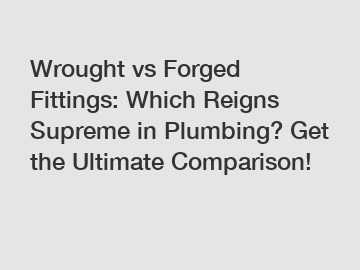Wrought vs Forged Fittings: Which Reigns Supreme in Plumbing? Get the Ultimate Comparison!
Wrought vs Forged Fittings: Which Reigns Supreme in Plumbing? Get the Ultimate Comparison!
Plumbing fittings play a crucial role in ensuring the smooth functioning and longevity of a plumbing system. Among the various types of fittings available, two popular options that often spark debate are wrought and forged fittings. Both seem to serve the same purpose, but their manufacturing processes and properties can vary significantly. In this article, we will delve into the world of wrought and forged fittings, compare their attributes, and determine which one truly reigns supreme in the field of plumbing.
Wrought fittings are manufactured by shaping heated metal into the desired form using machine tools. This process involves bending, stretching, and hammering the metal until it takes the desired shape. On the other hand, forged fittings are produced by heating a solid piece of metal and then shaping it using hydraulic or mechanical presses. This process involves compressing the material under enormous pressure to yield a fitting with superior strength and durability.

The key difference between wrought and forged fittings lies in their respective manufacturing processes. Wrought fittings, due to their shaping technique, generally have thinner walls compared to forged fittings. This makes them more suitable for applications where weight and space are critical factors. Forged fittings, on the other hand, offer exceptional strength, with thicker walls that can withstand higher pressure and temperature conditions. This makes them ideal for heavy-duty plumbing systems, such as industrial or commercial applications.
In terms of properties, wrought fittings are known for their excellent ductility, corrosion resistance, and ease of installation. They can be easily welded and threaded, allowing for quick and convenient assembly. On the contrary, forged fittings boast exceptional strength, hardness, and toughness, making them resistant to mechanical stress and wear. They are particularly well-suited for applications that demand a high level of reliability and long-term performance.
The choice between wrought and forged fittings ultimately depends on the specific requirements of the plumbing system. If weight and space are critical considerations, wrought fittings offer a suitable solution. Their ease of installation and resistance to corrosion make them suitable for residential plumbing projects. On the other hand, when it comes to heavy-duty applications that demand superior strength and durability, forged fittings are the go-to choice. Their ability to withstand extreme pressure and temperature conditions makes them indispensable in industrial settings.
In conclusion, while both wrought and forged fittings have their merits, their distinct manufacturing processes and properties set them apart in terms of suitability for different plumbing applications. The ultimate comparison reveals that the reign of supremacy lies with the purpose for which the fittings are intended. By understanding the differences between wrought and forged fittings, plumbing professionals can make well-informed decisions that ensure the long-term integrity and efficiency of their plumbing systems.
For more information, please visit weldolwt, steel flanges wholesale, scraper launcher and receiver factory.


